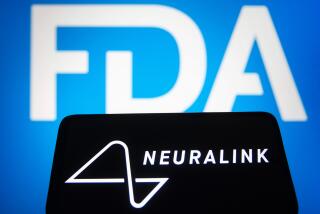FDA Withdraws OK for Jarvik Artificial Heart
- Share via
WASHINGTON — The Food and Drug Administration said Wednesday it has withdrawn its approval of further studies involving the Jarvik-7 artificial heart, a pioneering device once hailed as a breakthrough but later linked to strokes and other complications in patients who received it.
The agency said it took the action because problems associated with the mechanical heart and its manufacturer, Symbion Inc. of Tempe, Ariz., were endangering patients. Officials with the company could not be reached late Wednesday for comment.
The FDA said it would not allow Symbion to complete a long-term study in which seven patients were to receive the Jarvik-7 as a permanent replacement heart.
So far, only four such transplants have been done in the United States, and the recipients have died of infections or strokes caused by blood clots that developed within the artificial device.
“FDA inspections last year of the firm discovered serious deficiencies in the way the company was carrying out the studies,” said FDA spokesman Jeff Nesbit.
“Some aspects of manufacturing and quality control were found to be poor enough to endanger patients,” Nesbit said. “Unexpected adverse events were not reported to the FDA as required.”
Nesbit said that the FDA’s Center for Devices and Radiological Health also determined that Symbion’s research sites were not being monitored properly and that servicing of the equipment and training of personnel were not adequate.
“On balance, the deficiencies in the studies were great enough that the risks to patients were outweighing the benefits,” Nesbit said. He declined to elaborate on the agency’s concerns.
The Jarvik attracted worldwide attention in December, 1982, when it was first implanted in Barney Clark, a dentist who lived 112 days after receiving the device.
The Jarvik has been associated with strokes and other serious medical complications, and critics have questioned the quality of life experienced by patients who remain tethered to an outside power source by tubes.
In recent years, medical research has focused more attention on potential artificial hearts that would be contained entirely within the body, eliminating the external tubes that serve as a source of infection.
Besides acting to halt further use of the Jarvik as a permanent replacement heart, the FDA said it withdrew its approval of two related studies by Symbion.
One of the studies involves temporary “bridge” devices on patients awaiting human heart transplants, while the other involves “ventricular assist devices” implanted inside a human heart to help it function.
Nesbit said Symbion could appeal the FDA action.
“The company does have an opportunity to come in and argue its case and pledge to correct the deficiencies,” Nesbit said.






